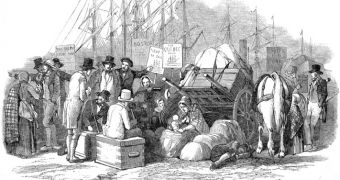A new study seems to indicate the fact that, in the 19th century, Irish emigrants to England renounced baptizing their children with Catholic names such as Patrick and Bridget, our of fear that the English would discriminate against them. The research team, based at the Durham and Northumbria universities, says that this trend of altering traditional baby names for fear of prejudice and discrimination can also be seen in other parts of the world today, in growing immigrant communities in large cities.
More than 30,000 records from 17 counties were studied, and the researchers noticed that the trend of giving Irish emigrant babies Catholic names went down considerably in the second-generation Irish, whereas the incidence of English Protestant names in the same category went up significantly. The authors say that previous studies already identified similar trends in communities such as the Turkish in Germany, the Indians in Australia, and the Irish migrants in the United States.
“We think that people chose to avoid traditional names to minimize prejudice rather than people simply being influenced by general or English names within their community and choosing those instead. In some of our other work, we have found that prejudice against the Irish immigrant community was quite common. At the time, there was a feeling among the British public that the Irish would come and take over their jobs and possibly even spread disease. This would explain why the Irish immigrants tried to take steps to hide their Irish identity to avoid discrimination,” DU Anthropology Department expert Dr. Malcolm Smith says.
Smith is also the lead author of a new paper detailing the finds, which was published in the latest issue of the journal Annals of Human Biology. The research was funded by the Economic and Social Research Council (ESRC). “There is ample historical evidence of the difficult and often hostile situation which many Irish people faced in as immigrants escaping the Great Famine. It is highly likely that the first Irish immigrants were an embattled enclave who decided against traditional Irish names for their children because of the prejudice those names drew down. Had their strategy been to assert their Irish identity, we would probably have seen a jump in traditional Irish names,” NU Professor in History Donald MacRaild adds.
“Nineteenth century emigrants from Ireland to Britain and North America attempted to make their names appear as white, Anglo-Saxon and protestant as possible to increase their social standing, reduce the possibility of racial prejudice and generally disguise their Irish roots in the days when 'No Irish Need Apply' was a familiar notice in job adverts. In Britain, there was a tendency for people to 'translate' their surnames into loosely corresponding English surnames and in the United States it became common to drop the O or Mc prefix to make names appear more American,” Irish Family History Foundation Director Gerard Delaney concludes.

 14 DAY TRIAL //
14 DAY TRIAL //